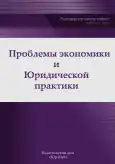Historical Stages of Formation of the Doctrine on the Protection of the Weak Party of the Contract
- Authors: Kuzmina A.V.1, Lomakina E.A.1
-
Affiliations:
- Mari State University
- Issue: Vol 18, No 5 (2022)
- Pages: 72-81
- Section: Articles
- URL: https://journal-vniispk.ru/2541-8025/article/view/147345
- ID: 147345
Cite item
Abstract
About the authors
Anna V. Kuzmina
Mari State University
Email: tsyplenkova@mail.ru
Cand. Sci. (Law), Associate Professor, Associate professor of Department of civil law and process Yoshkar-Ola, Russian Federation
Ekaterina A. Lomakina
Mari State University
Email: lomakina3004@rambler.ru
assistant, postgraduate student, assistant, department of civil law and process Yoshkar-Ola, Russian Federation
References
- Braginskij M.I., Vitryanskij V.V. Contract Law: General Provisions. М., 2011. 847 p.
- Vitryanskij V.V. Reform of the Russian civil legislation: intermediate results. М., 2017. 432 p.
- Karapetov A.G. Contra proferentem as a method of interpreting the contract // Bulletin of the Supreme Arbitration Court of the Russian Federation. 2013. № 7. P. 6-35.
- Karapetov A.G. Freedom of contract and its limits: in 2 vols. V.1. Theoretical, historical and political and legal foundations of the principle of freedom of contract and its limitations. М.: Statute, 2012. 452 p. 1 vol.
- Karapetov A.G. Freedom of contract and its limits: in 2 vols. V.2. Limits of freedom to determine the terms of the contract in foreign and Russian law. М.: Statute, 2012. 453 p. 2 vol.
- Klochkov A.A. Standard (general) terms of contracts in commercial circulation: legal regulation in Russia and foreign countries: Dis. ... cand. legal sciences: 12.00.03. М., 2000. 210 p.
- Kuzmina A.V. Formation of the doctrine of the protection of the weak party in contract law // Bulletin of the Perm university. Legal sciences. 2019. №. 46. P. 704-705.
- Makeenkov I.A. Ways to protecting of the weak side of the accession agreement from unfair contractual terms: civil law and antimonopoly aspects // Civil law. 2018. № 5. P. 38-40.
- Makovskij A.L. About codification of civil law (1922-2006). М., 2010. 736 p.
- Medvedev S.N. Laesio enormis in Roman and modern civil law // North caucasian legal bulletin. 2010. № 2. P. 34.
- Mullina Yu.N. Control over unfair contractual terms: Russian law in a comparative legal perspective // Experiences of civil law research: a collection of articles / hands ed. coll. and resp. ed. A.M. Shirvindt, N.B. Shcherbakov. M.: Statut, 2016. P. 196-224.
- Myagkova O.I. Protection of the weak party from unfair contract terms in Russian civil law // Russian journal of law. 2016. № 1. P. 123-135.
- Noviczkij I.B., Luncz L.A. The general doctrine of obligation. M.: Gosjurizdat, 1950. 416 p.
- Petinenko I.A. Fair prices: theoretical aspect // Vestn. Tomsk state university. Economy. 2011. № 2 (14). P. 37.
- Savel`ev A.I. Contract of adhesion in Russian civil law // Bulletin of civil law. 2010. № 5. P.13.
- Slaveczkij D.V. The principle of protection of the weak side of the civil contract: Dis. ... cand. legal sciences: 12.00.03. Samara, 2004. 204 p.
- Tuzov D.O., Chichkan E.V., Sargsyan A.M. Protection of consumers from unfair contractual terms in Italian law (in comparison with Russian regulation) // Law. 2021. № 9. P. 150-183.
- Khuzhokova I.M. The doctrine of good morals and public order in contract law. Moscow: Norm, 2011. 208 p.
- Cyplenkova A.V. Contract of adhesion as a special category of civil law: Dis. ... cand. legal sciences: 12.00.03. М., 2002. 202 p.
- Shapp Ya. The system of German civil law. M.: International relations, 2006. 357 p.
- Baculin A.F., Kuzmina A.V., Miagkova O.I. Contract of Adhesion and Conceptional Changes in Russian Contract Law // Review of European Studies. 2015. January 1. Р.22-23.
- D'Onfro D.F. A New Uniform Code of Consumer Credit // Harvard Law & Policy Review. 2011. Vol. 5. № 2. P. 449-450.
- Duncan N.K. Adhesion Contracts: A Twentieth Century Problem for a Nineteenth Century Code // La. L. Rev. 1974. № 34. URL: https://digitalcommons.law.lsu.edu/lalrev/vol34/iss5/11 (дата обращения 09.03.2022).
- Feinman J.M., Edwards C., Poritz D.T. Henningsen V. Bloomfield Motors, Inc. (1960): Promoting Product Safety by Protecting Consumers of Defective Goods. Courting Justice: Ten New Jersey Cases That Shook the Nation, edited by Paul L. Tractenberg, Ithaca, NY: Rutgers University Press. 2013. P. 5-22. URL: https://doi.org/10.36019/9780813561608-003 (дата обращения: 06.04.2022).
- Kessler. F. Contracts of Adhesion-Some Thoughts About Freedom of Contract // Colum. L. Rev. 1943. № 43. P. 635.
- Patterson. E. The Delivery of A Life-Insurance Policy // Harv. L. Rev. 1919. № 33. P. 222.
- Rakoff T. Contracts of Adhesion: An Essay in Reconstruction // Harv. L. Rev. 1982. № 96. P. 1174-1177.
- Saxe S.L. Contracts of Adhesion Under California Law // University of San Francisco law review. 1966. Vol. 1: Iss. 1. Article 19. P. 308-309.
- Slawson W.D. Standard Form Contracts and Democratic Control of Lawmaking Power // Harv. L. Rev. 1971. № 84. P. 529-530.
- Smith S. Reforming the Law of Adhesion Contracts: A Judicial Response to the Subprime Mortgage Crisis // Lewis & Clark Law Review, Forthcoming, Marquette Law School Legal Studies. 2009. № 09-34. P. 1096-1097.
- Zimmermann R. The Law of Obligations. Roman Foundations of the Civilian Tradition. Oxford, 1996. P. 166-168.
Supplementary files








